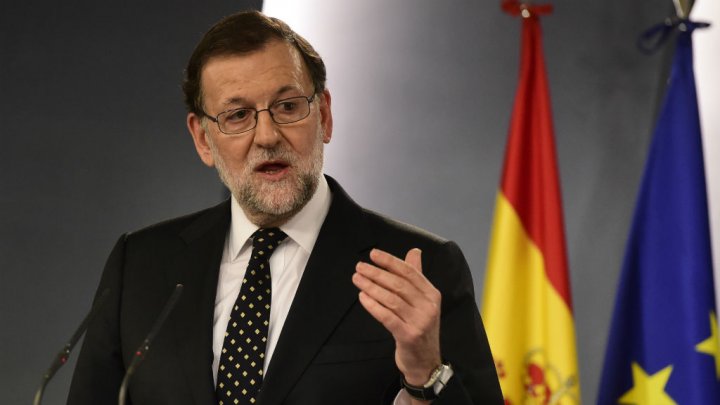“In Spain, there is no impunity for the corrupt because it is a country with controls in place, and they are now stricter than ever”, says Mariano Rajoy
The President of The Government, Mariano Rajoy, has appeared before the extraordinary plenary session of the Lower House of Parliament. In his speech, he referred to his government’s priorities: the fight against Jihadi terrorism, preserving the unity of Spain, and consolidating the economic recovery and job creation.
The session began with a minute’s silence in tribute to the victims of the recent attacks in Barcelona and Cambrils. The President of the Government began his speech by offering them and their families his support and well-wishes.
He then expressed to the Lower House the government’s recognition of the work of the State law enforcement agencies, and the role played by the members of the health service and of the civil protection system, and reiterated his support for the consular service. “They have harmed us, but they have not won, and they will not win”, he said. We will be “united in our firm effort to put an end to the worst threat that now faces the West”, he added.
On the specific question that is the subject of this extraordinary session – the demand for political accountability from the President of the Government for certain cases of corruption in the governing party – the People’s Party, Mariano Rajoy recalled the many times he had spoken as President of the Government to offer explanations in this respect – 52 in the Lower House alone. In the opinion of the President of the Government, given the explanations offered, “and seeing the challenges we have to face, it is difficult to understand the need to hold a debate on this matter, in an extraordinary session outside the normal period of sittings”.
The President of the Government noted that our Constitution “has established an instrument for demanding political accountability from the government: the motion of no confidence”. Not long ago, he recalled, following the debate on a motion of no confidence, the Lower House again expressed its support for him. “My obligation is therefore to govern, to do my duty to the Spanish people and to this House, and I am not going to abdicate from this responsibility”, he added.
Referring to some of the tasks the government must take on, Mariano Rajoy pointed to the “extremely serious attacks in Barcelona and Cambrils, a reminder that the fight against terrorism must be our maximum priority”, as well as “preserving the unity of Spain, our constitutional text, and with it, our democratic system”, and to “continue with the economic recovery while ensuring that it reaches all households”.
Together with these priorities, he said, “I am also concerned by the fight to improve the level of honesty and transparency in public life. I have worked a great deal to this end in recent years, and I am prepared to continue to do so in the future”. As proof of this, he referred to the approval of “a dozen laws with the sole aim of improving the trust of citizens in our democratic system”. In his words, he has done so “out of democratic conviction, without anyone obliging us to do so… Because I have always believed that reforms are more effective against corruption than reproaches”.
Among the laws, he mentioned the amendment of the Party Funding Act, “which my government wanted to make stronger… cutting the subsidies to the parties and limiting the funding they receive from other sources”, the establishment of more limits and controls, and the approval of a new law to control all economic and financial activity by political parties. In short, he said, “today, all parties have to submit their accounts to the Court of Auditors… They have to comply with the strictest laws that there have ever been in our country”.
Along the same lines, he added, is the establishment of the strictest controls on the public administration and its officers, as can be seen in the approval of the Transparency and Good Governance Act, the Senior Civil Servant Charter, the strengthening of the action of the justice system, and the creation of the Office for the Recovery and Management of Assets.
These and other initiatives, explained Mariano Rajoy, “allow me to say that my government has provided more instruments than any other to the courts to deal with corruption”, so that “in Spain there is no impunity for the corrupt, because it is a country with controls in place, and they are now stricter than ever”. “The institutions, justice and the rule of law work. And I will always try to ensure this is the case, because it is what I believe”, he explained, while repeating his desire to “continue working to improve the instruments for supervision, prevention and sanctions that allow us to be more effective in the fight against corruption”.
Mariano Rajoy ended his appearance by referring to “my Government’s priorities… the challenges that must receive our priority attention: that we should be united in the face of the terrorist threat, united in Spain, which means strengthening the Pact Against Jihadi Terrorism, and in our unity with our European partners… we must be aware of the gravity of the situation when some people want to destroy our national unity and coexistence, with disdain for the most elementary rules of democracy”. Against these attempts, “the Government will act with the firmness required by the magnitude of the provocation to our rule of law, our Constitution and the self-government of Catalonia itself”, and work to “improve the good growth figures for economic growth and job creation to a total of 20 million people at work”.





